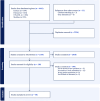Electronic Health Records for Predicting Outcomes to Work-Related Musculoskeletal Disorders: A Scoping Review
- PMID: 38536622
- PMCID: PMC11550283
- DOI: 10.1007/s10926-024-10175-1
Electronic Health Records for Predicting Outcomes to Work-Related Musculoskeletal Disorders: A Scoping Review
Abstract
Purpose: Through electronic health records (EHRs), musculoskeletal (MSK) therapists such as chiropractors and physical therapists, as well as occupational medicine physicians could collect data on many variables that can be traditionally challenging to collect in managing work-related musculoskeletal disorders (WMSDs). The review's objectives were to explore the extent of research using EHRs in predicting outcomes of WMSDs by MSK therapists.
Method: A systematic search was conducted in Medline, PubMed, CINAHL, and Embase. Grey literature was searched. 2156 unique papers were retrieved, of which 38 were included. Three themes were explored, the use of EHRs to predict outcomes to WMSDs, data sources for predicting outcomes to WMSDs, and adoption of standardised information for managing WMSDs.
Results: Predicting outcomes of all MSK disorders using EHRs has been researched in 6 studies, with only 3 focusing on MSK therapists and 4 addressing WMSDs. Similar to all secondary data source research, the challenges include data quality, missing data and unstructured data. There is not yet a standardised or minimum set of data that has been defined for MSK therapists to collect when managing WMSD. Further work based on existing frameworks is required to reduce the documentation burden and increase usability.
Conclusion: The review outlines the limited research on using EHRs to predict outcomes of WMSDs. It highlights the need for EHR design to address data quality issues and develop a standardised data set in occupational healthcare that includes known factors that potentially predict outcomes to help regulators, research efforts, and practitioners make better informed clinical decisions.
Keywords: Electronic health records; Medical informatics; Occupational health physicians; Occupational injuries; Rehabilitation.
© 2024. The Author(s).
Conflict of interest statement
The authors Melinda Wassell, Peter McCann, Andrew Vitiello, Karin Verspoor, Kerryn Butler-Henderson and Henry Pollard have no relevant financial or non-financial interests to disclose.
Figures
References
-
- Safe Work Australia. The cost of work-related injury and illness for Australian employers, workers, and the community, 2012-13. Canberra: Safe Work Australia; 2015.1-44
-
- Oakman JC, Stuckey S (2019) R. Work-Related Musculoskeletal Disorders in Australia. Canberra: Safe Work Australia.
-
- Amell T, Kumar S. Work-related musculoskeletal disorders: design as a prevention strategy. A review J Occup Rehabil. 2001;11(4):255–265. - PubMed
Publication types
MeSH terms
LinkOut - more resources
Full Text Sources
Medical



